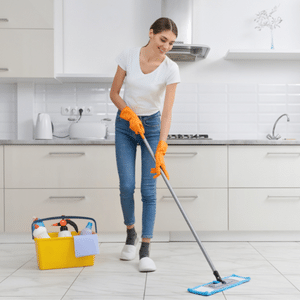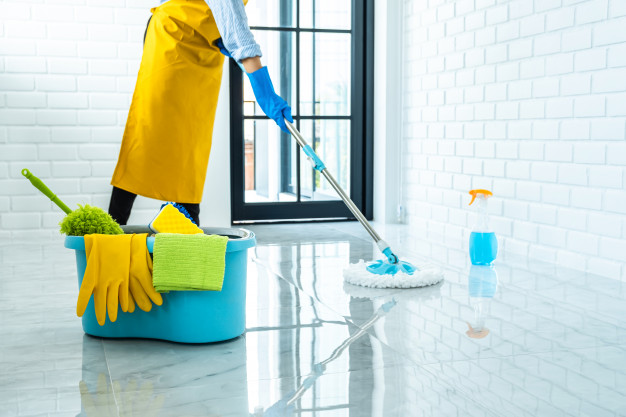So, here’s the thing folks. We’ve all been there. The sink is overflowing with dirty dishes, the carpet has mysteriously transformed into a minefield of crumbs, and the dust on the shelves is practically waving at you. It’s like your home has formed an alliance against cleanliness and it’s winning. That’s when you decide it’s time to call in reinforcements – a biweekly house cleaner. But hold your horses, fellow neatniks, before you bust out your wads of cash and start handing out tips like Oprah on a giveaway spree, let’s take a moment to ask ourselves a burning question: Do you tip a biweekly house cleaner?
Now, we must tread carefully here, because the topic of tipping can often be as treacherous as navigating a field of Lego pieces in the dark. We don’t want to rock the boat, but we also don’t want to be stingy. So, let’s consider this conundrum from a humorous point of view, shall we? On one hand, your house cleaner is providing a valuable service, freeing up your time and taking care of those pesky chores you’d rather avoid like a vampire avoids sunlight. They’re a superhero in an apron, swooping in to save the day and make your home sparkle like the surface of a freshly glazed doughnut. But on the other hand, if you’re paying them a pretty penny for their services, should you also be expected to fork over additional cash for a job well done? It’s a tipping tightrope, my friends, and we’re walking it. Well, sort of. We’re more like crawling on our hands and knees and hoping we don’t fall off. But fear not, for we shall navigate this tipping tempest with the utmost grace and a dash of humor.

This image is property of nwmaids.com.
Factors to Consider
Quality of Service
When considering whether or not to tip a biweekly house cleaner, one important factor to consider is the quality of service provided. Has the house cleaner consistently delivered a thorough and satisfactory cleaning? Are they attentive to detail and take pride in their work? If the house cleaner consistently goes above and beyond to ensure the home is spotless and well-maintained, it may be worth considering a tip as a token of appreciation.
Length of Service
Another factor to take into account is the length of service provided by the house cleaner. Has the same cleaner been working for you consistently for a significant period? Building a long-term relationship with a reliable house cleaner can be beneficial for both parties, as the cleaner becomes familiar with the nuances of your home and your specific cleaning preferences. If you have been employing the same biweekly house cleaner for an extended period, it may be worth considering tipping them as a gesture of recognition for their loyalty and dedication.
Complexity of Cleaning Tasks
The complexity of the cleaning tasks involved can also be a determining factor when deciding whether or not to tip a biweekly house cleaner. If the cleaner faces particularly challenging and time-consuming cleaning tasks, such as deep cleaning carpets or tackling stubborn stains, tipping may be a way to recognize their extra effort and hard work. It is important to acknowledge and appreciate the extra effort put into handling demanding cleaning tasks.
Understanding House Cleaner’s Wage
Hourly Rates vs. Flat Fees
House cleaners are typically compensated either through hourly rates or flat fees. Hourly rates are often more common, where the cleaner is paid based on the number of hours worked. On the other hand, flat fees involve a predetermined amount for each cleaning session, regardless of the actual duration. It is important to take the cleaner’s chosen payment structure into account. If they are already being paid well through a flat fee, tipping may not be necessary. However, if their compensation is primarily based on hourly rates, a tip can be considered a thoughtful bonus.
Average Pay for Biweekly House Cleaners
The average pay for biweekly house cleaners varies depending on various factors such as location, experience, and the complexity of the cleaning tasks involved. It is essential to research the average pay rates in your area to ensure that the house cleaner is being fairly compensated. If their current pay already aligns with the average rates, tipping may not be expected. However, if their pay falls below the average, tipping can serve as a way to supplement their income and show gratitude for their hard work.
Regional Variations in Rates
It is worth noting that rates for house cleaning services can be regionally dependent. Different areas may have varying cost-of-living expenses and market demands, leading to different pay rates for house cleaners. Researching the specific rates in your region will provide a clearer understanding of the local standards. If the regional rates are higher than what the cleaner is already receiving, tipping can be a way to bridge the gap and ensure fair compensation.
The Etiquette of Tipping
Tipping Culture
Tipping has long been a part of service culture, where customers express their satisfaction and appreciation through monetary gratuity. While tipping expectations vary across different industries and countries, the service sector typically involves tipping as a way to acknowledge exceptional service. Understanding the prevailing tipping customs in your area can help determine whether tipping a biweekly house cleaner is customary or expected.
Tipping in the Service Industry
The etiquette of tipping extends beyond restaurants and hotels. Many service-based professions, including house cleaners, rely on tips as a significant portion of their income. Tipping is a way to supplement their wages and acknowledge their hard work. By recognizing the value of their service and the effort they put into maintaining a clean and comfortable home, you can contribute to supporting the livelihood of house cleaners.
Debating Tipping for House Cleaners
There may be ongoing debates and discussions about whether or not to tip biweekly house cleaners. Some argue that tipping is not necessary, as it is already reflected in their hourly rates or flat fees. Others believe that tipping is essential to show appreciation for the physical labor and attention to detail involved in cleaning homes. Ultimately, the decision to tip should be based on your personal values, financial circumstances, and the quality of service provided.
Pros and Cons of Tipping
Pros of Tipping
Tipping a biweekly house cleaner can have several advantages. Firstly, it is a way to acknowledge and appreciate their hard work, dedication, and attention to detail. Tipping can also help build a positive and respectful relationship with the house cleaner, fostering a sense of mutual respect and collaboration. Additionally, tipping can contribute to higher job satisfaction for the cleaner, which can lead to even better service in the future. It is a means to incentivize and reward exceptional service.
Cons of Tipping
While there are many arguments in favor of tipping, there are also potential drawbacks to consider. One of the main concerns is the financial burden tipping can impose. If you are on a tight budget or already paying premium rates for cleaning services, tipping may not be a feasible option. Additionally, the inconsistency in tipping practices across different households may create an uncertain or unfair environment for house cleaners. Some may receive frequent tips while others may not, leading to feelings of inequality.
Alternative Ways to Show Appreciation
If tipping is not a viable option for you, there are alternative ways to show appreciation for your biweekly house cleaner. Providing positive feedback and expressing gratitude for their hard work can go a long way. Consider writing a note or leaving a kind message after each cleaning session. Another option is to give small gifts or gift cards on special occasions as a token of appreciation. Exploring these alternatives can help maintain a positive relationship with the house cleaner without relying solely on monetary gratuity.

This image is property of iopenusa.com.
Calculating the Tip Amount
Percentage-Based Tipping
When determining the appropriate tip amount for a biweekly house cleaner, one method is to base it on a percentage of the total cleaning cost. A common range for tipping house cleaners is 10-20% of the service fee. However, this percentage can vary depending on factors such as the complexity of the tasks, the frequency of service, and your level of satisfaction. It is important to evaluate these factors and adjust the percentage accordingly to ensure a fair and considerate tip amount.
Fixed Amount Tipping
Another approach to calculating the tip amount is to use a fixed amount regardless of the total cleaning cost. This method can be more straightforward and easier to calculate. For example, you may choose to tip a specific amount per cleaning session, such as $10 or $20, regardless of the complexity or duration of the cleaning tasks. This approach can ensure consistency in tipping and make it easier to budget for tipping expenses.
Considering the Service Frequency
The frequency at which you employ a biweekly house cleaner can also influence the tip amount. If the cleaner visits your home regularly, such as twice a month, you may choose to tip a slightly higher amount as a way to recognize their ongoing dedication and service. However, if the cleaner only visits sporadically or on a one-time basis, a lower tip amount may be more appropriate. Consider the frequency of service and the value you place on their consistent presence when determining the tip amount.
Guidelines for Tipping
Establishing a Gratuity Standard
To ensure clarity and fairness in tipping, it can be helpful to establish a gratuity standard with your biweekly house cleaner. This can involve an open conversation about tipping expectations and preferences. Discussing gratuity openly can help both parties understand each other’s perspectives and avoid any potential miscommunication or discomfort. By setting a gratuity standard, both you and the house cleaner can navigate the tipping process more smoothly and with a mutual understanding.
Communicating with the House Cleaner
Open and effective communication is crucial when it comes to tipping a biweekly house cleaner. Discussing tipping expectations, concerns, or changes in financial circumstances can foster a transparent and respectful relationship. It is important to establish a safe space for both parties to express their needs and preferences. Regular conversations about compensation and gratitude can help manage expectations and maintain a positive working relationship.
Tipping on Holidays or Special Occasions
Holidays and special occasions often warrant extra recognition and appreciation for the biweekly house cleaner. Tipping them a higher amount or providing a small bonus during these times can be a thoughtful gesture. This can include occasions such as Christmas, New Year’s, their birthday, or any other significant date. Tipping on these occasions shows that you value their contributions and recognizes the additional effort they may put into ensuring your home is in top shape during festive times.

This image is property of cleanwithdna.com.
When Not to Tip
Poor Quality of Service
While tipping is a way to reward exceptional service, it is important to consider other factors when deciding whether or not to tip a biweekly house cleaner. If the quality of service consistently falls below expectations or if the cleaner fails to meet agreed-upon requirements, it may be appropriate to reconsider tipping. Tipping should be reserved for those who consistently provide high-quality service and go above and beyond their regular duties.
Lack of Professionalism
Professionalism is another crucial aspect to evaluate before tipping a biweekly house cleaner. If the cleaner consistently displays unprofessional behavior, such as arriving late, mishandling personal belongings, or disregarding agreed-upon boundaries, it may be necessary to forgo tipping. Tipping should be reserved for cleaners who demonstrate professionalism and respect throughout their interactions with you.
Frequency of Tipping
Tipping a biweekly house cleaner may not be necessary on every visit. If you consistently tip at each cleaning session, it may diminish the impact of the gesture and create an unsustainable expectation. Consider tipping periodically or on special occasions to maintain the element of surprise and showcase genuine appreciation for the cleaner’s efforts. It is important to find a balance that works for both you and the house cleaner when it comes to the frequency of tipping.
Other Forms of Appreciation
Providing Positive Feedback
In addition to tipping, providing positive feedback is an invaluable form of appreciation for a biweekly house cleaner. Taking the time to express your satisfaction and specific areas of commendation can boost their morale and confidence in their work. Positive feedback allows them to understand what they are doing well and encourages them to maintain high standards. A simple verbal acknowledgment or written note can make a significant impact and serve as an alternative method of appreciation.
Writing a Testimonial or Review
If you have had an exceptional experience with a biweekly house cleaner, consider going a step further and writing a testimonial or review for them. These testimonials or reviews can be posted on their website, social media platforms, or shared with their potential clients. By sharing your positive experience and satisfaction, you are not only contributing to their professional reputation but also providing them with tangible evidence of their exceptional service.
Gifts or Gift Cards
While tipping with cash is a common practice, gifts or gift cards can also be a thoughtful way to show appreciation to a biweekly house cleaner. Consider their preferences or interests when selecting a gift. It could be something as simple as a bouquet of flowers, a favorite snack, or a gift card to their preferred store or restaurant. These alternative forms of appreciation demonstrate a personal touch that recognizes their individuality and fosters a positive working relationship.

This image is property of homespritz.ca.
Legal Ramifications
Legal Requirements for Tipping
It is essential to be aware of any legal requirements or restrictions concerning tipping a biweekly house cleaner. Depending on your location, there may be laws or regulations dictating how gratuity should be handled. Familiarize yourself with the legal landscape and consult local laws or employment regulations to ensure compliance. Understanding the legal implications of tipping can help protect both you and the house cleaner from any potential legal risks.
Misclassification of House Cleaners
Misclassification of house cleaners as independent contractors or employees can have legal implications for tipping. If the cleaner is an independent contractor, the rules surrounding tipping may vary compared to those of an employee. Independent contractors may have different tax obligations and financial arrangements, which should be considered when determining whether or not to tip. It is important to clarify the status and legal classification of the house cleaner before making any tipping decisions.
Employment Contracts and Payment
Employment contracts and payment agreements between you and the biweekly house cleaner can also impact tipping. The terms stipulated in the contract, such as compensation structure and additional benefits, should be taken into consideration. If the contract explicitly includes gratuity or states that tipping is not expected, it is important to adhere to those terms. Ensuring that your tipping practices align with the agreed-upon terms can help maintain a fair and respectful working relationship.
Conclusion
In conclusion, tipping a biweekly house cleaner can be a way to show appreciation for their hard work, attention to detail, and professionalism. Factors such as the quality of service, length of service, and complexity of cleaning tasks should be considered when deciding whether or not to tip. Understanding house cleaner’s wage structure, regional variations, and the etiquette of tipping is essential for making an informed tipping decision. Tips can be calculated based on a percentage of the total cleaning cost or a fixed amount, taking into account the frequency and value of the service received. It is important to establish open communication, consider alternative forms of appreciation, and be aware of legal requirements and contractual agreements. Ultimately, tipping should be a personal decision based on your values, the house cleaner’s performance, and your financial circumstances.

This image is property of www.qbclean.com.

